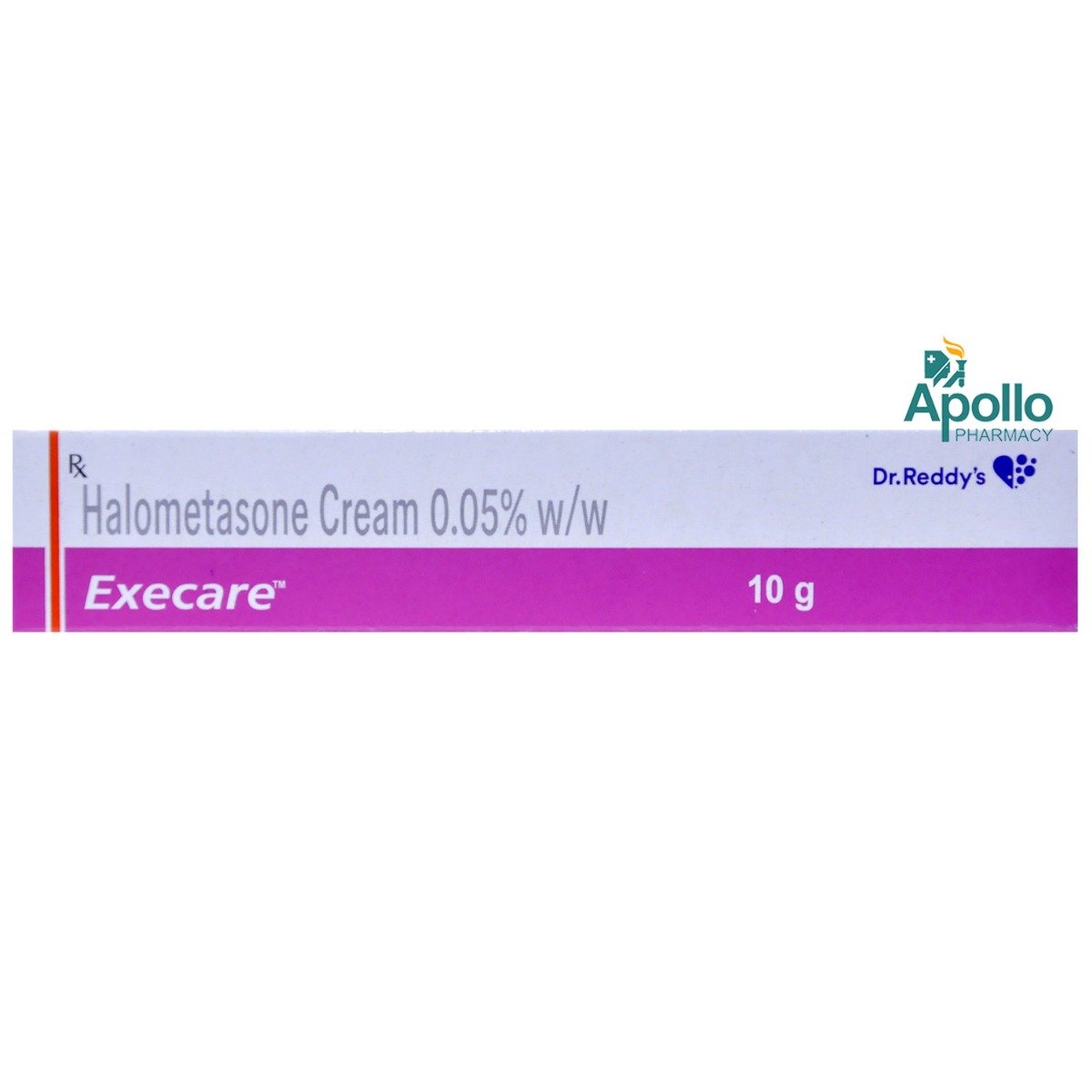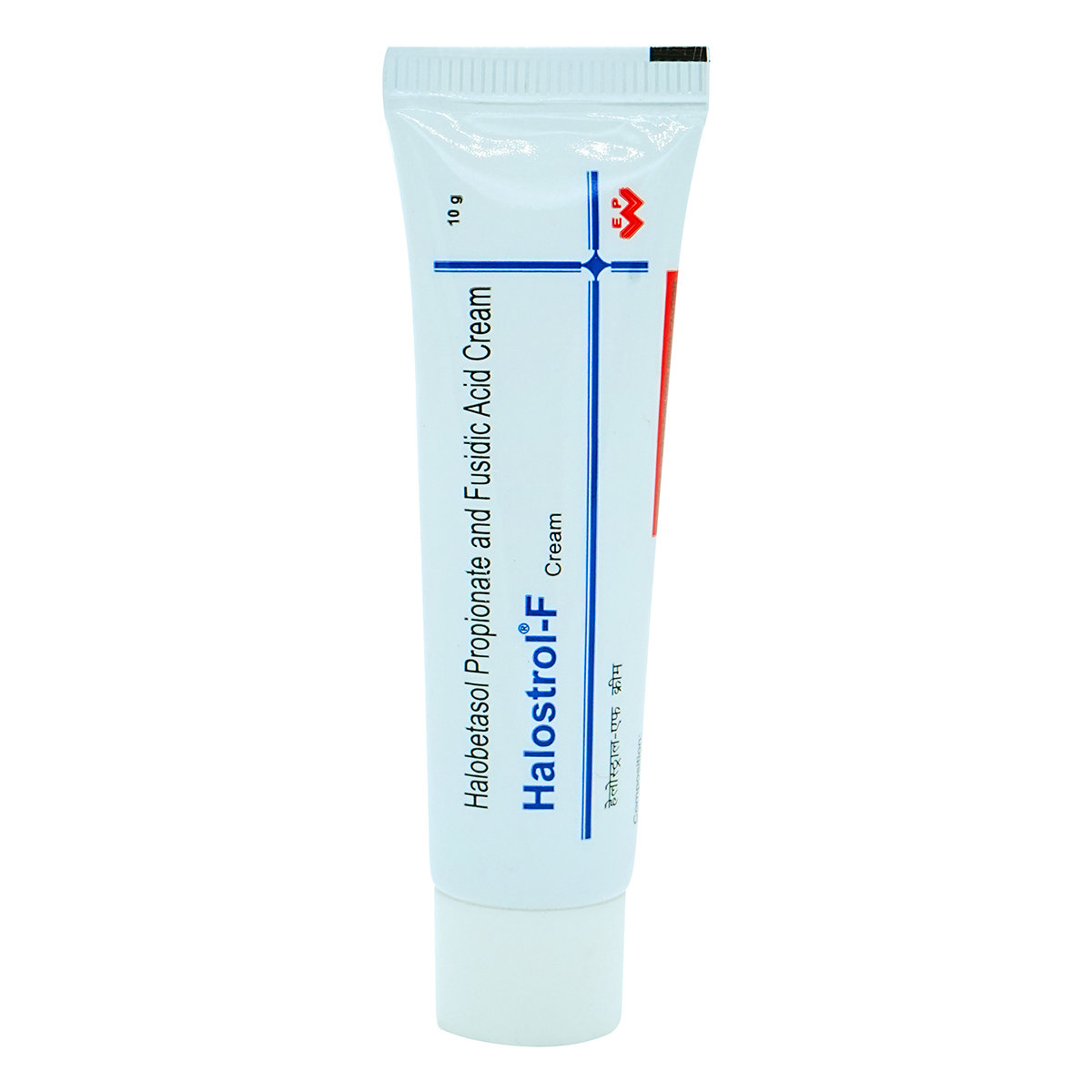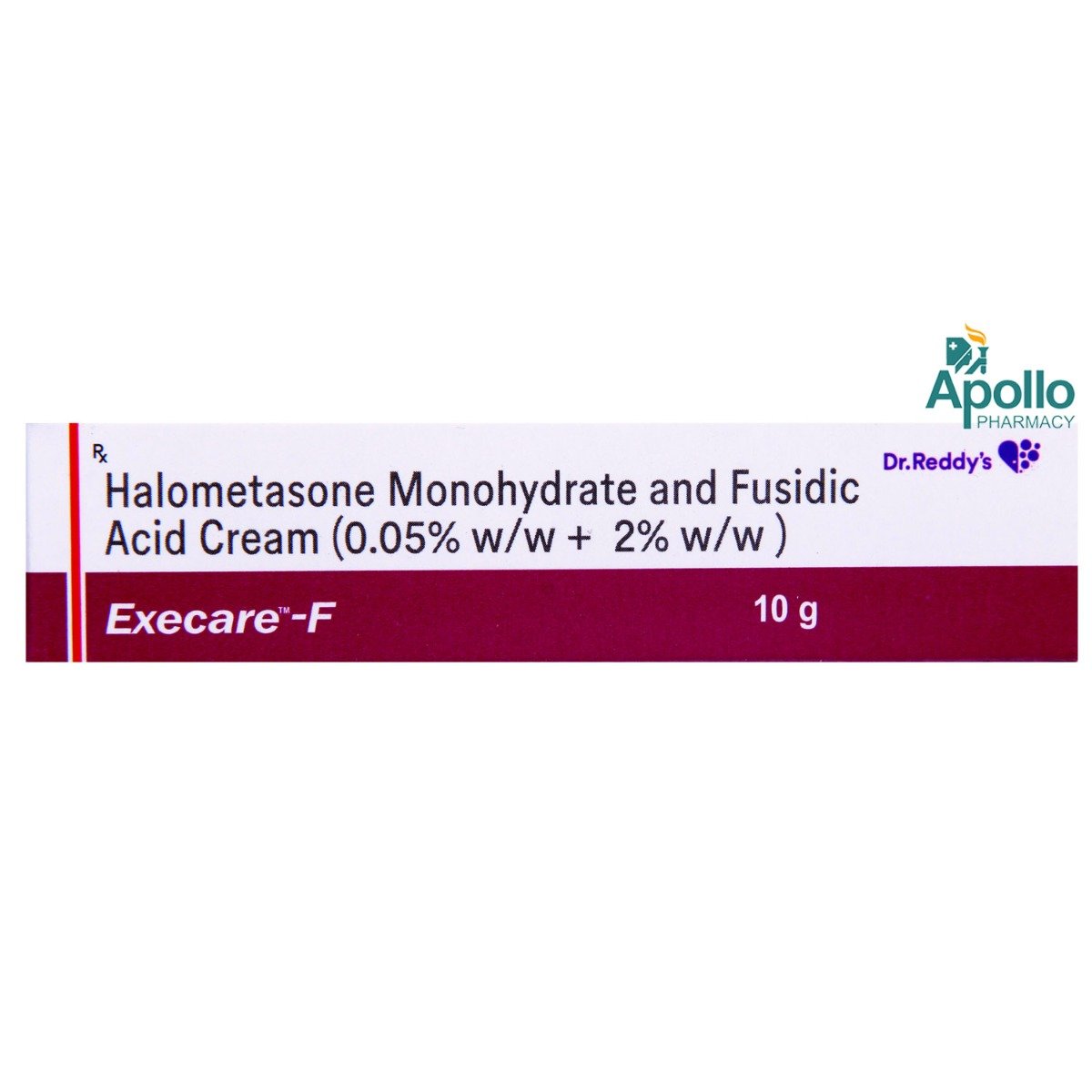Halometasone
About Halometasone
Halometasone belongs to a class of dermatological preparation called 'Corticosteroids' primarily used to prevent allergies, including swelling, itching, redness, heat and pain caused due to certain skin problems such as psoriasis (scales and itchy, dry patches), dermatitis (itchy, swelling of the skin) and eczema (itchy, cracked, swollen or rough skin). The swelling of the skin occurs when an allergic reaction or skin irritation releases several substances in the skin that widens blood vessels and cause itching, redness, pain and swelling in the irritated area. Eczema is when skin patches become inflamed, itchy, cracked and rough. Dermatitis is a skin condition that causes itchy, dry skin or a rash on swollen, reddened skin.
Halometasone contains Halometasone belongs to the class of corticosteroids. It works by blocking prostaglandins (chemical messengers) production that makes the affected area red, swollen and itchy. It effectively treats inflammation and itchiness caused by eczema (inflamed and itchy skin), dermatitis (itchy, swelling of the skin) and psoriasis (skin cells build up and form scales and itchy, dry patches).
Use Halometasone as prescribed by your doctor. Your doctor will advise the appropriate dose depending on your medical condition. Avoid contact of Halometasone with nose, mouth or eyes. If Halometasone comes in contact with these areas accidentally, rinse with water thoroughly. Common side effects of Halometasone include burning, irritation, itching and redness at the application site. Most of these side effects of Halometasone do not require medical attention and gradually resolve over time. However, if the side effects persist or worsen, please consult your doctor.
If you are known to be allergic to Halometasone or any other medicines, please tell your doctor. If you are pregnant or a nursing mother, it is advised to consult a doctor before using Halometasone. Please consult your doctor before using Halometasone in children. Do not use Halometasone in more than prescribed doses or on a large area of skin for a prolonged time, as it may cause adverse effects. Do not wrap or cover the treated area with a bandage unless advised by your doctor. Avoid smoking or going near naked flames as the fabric (bedding, clothing, dressings) that is in contact with Halometasone catches fire and burns easily. Topical use of corticosteroids (Halometasone) may sometimes cause systemic immunosuppression while treating infections such as a fever or sore throat. This condition may worsen the infections. Hence Halometasone should be carefully used with patients with active infections.
Uses of Halometasone
Medicinal Benefits
Halometasone consists of ‘Helometasone’ a topical corticosteroid with anti-inflammatory and immunosuppressive effects. It is used to treat swelling, itching, redness, heat and pain caused due to certain skin problems such as psoriasis (scales and itchy, dry patches), dermatitis (itchy, swelling of the skin) and eczema (itchy, cracked, swollen, or rough skin). Halometasone acts inside the skin cells and inhibits the release of certain chemical messengers (prostaglandins) in the body that causes redness, itching and swelling. When the skin reacts to allergens, such chemicals are released normally.
Directions for Use
- Follow the recommended dosage and duration to get optimal results.
- Apply a thin layer of Halometasone with clean and dry hands on the affected areas. You can apply Halometasone with a clean cotton wool or gauze swab. Gently rub the medicine into the skin until it has disappeared.
- Wash your hands before and after applying Halometasone on the affected areas unless the treatment is for the hands.
- If Halometasone gets into your eyes, nose, mouth, or vagina, rinse thoroughly with cold water.
Storage
Side Effects of Halometasone
- Irritation of the skin
- Erythema (skin redness)
- Mild irritation
- Dry skin
- Acne
- Burning sensation at the site of application
Drug Warnings
Do not use Halometasone in large amounts or use it for a long time than prescribed, as it does not give quick or better results but increases the risk of side effects and makes skin more sensitive to Halometasone. If you are pregnant or a nursing mother, it is advised to consult a doctor before using Halometasone. Halometasone is not recommended for children below 1 year of age as large amounts of Halometasone may be absorbed through the skin easily in children and cause adverse effects. Avoid using Halometasone on open wounds, windburned, sunburned, irritated or dry skin. Do not cover or wrap the treated area with a bandage unless advised by your doctor, as it may cause harmful effects. Avoid contact with topical Halometasone with the nose, mouth or eyes as it may irritate. In case Halometasone comes in contact with these areas accidentally, rinse with water thoroughly. Avoid smoking or going near naked flames as the fabric (bedding, clothing, dressings) that is in contact with Halometasone catches fire and burns easily. If you have diabetes, psoriasis, leg cramp, rosacea, adrenal gland or liver problems, and other skin problems, inform your doctor before taking Halometasone. While taking Halometasone, do not contact anyone with shingles, chickenpox or measles. If you accidentally come in contact with any person having them, please inform your doctor immediately, as it requires special treatment if you have not had these illnesses.
Drug Interactions
Drug-Drug Interaction: Halometasone may interact with anti-diabetes (acarbose, canagliflozin, alogliptin, albiglutide, acetohexamide), used to prevent organ rejection (cyclosporine), dopamine receptor agonists (bromocriptine), diuretic (benzthiazide, bendroflumethiazide), adrenal steroid inhibitor (aminoglutethimide) cardiac glycoside (acetyldigitoxin).
Drug-Food Interaction: Halometasone may interact with alcohol. Therefore, avoid the consumption of alcohol with Halometasone.
Drug-Disease Interaction: If you have diabetes, psoriasis, glaucoma, cataracts, adrenal gland or liver problems and any other skin infections, inform your doctor before taking $nam.
Drug-Drug Interactions Checker List:
Safety Advice

Alcohol
cautionNo interactions were found.

Pregnancy
cautionConsult your doctor before using Halometasone in your pregnancy. Your doctor may prescribe this medicine if the benefits outweigh the risks.

Breast Feeding
cautionIt is unknown whether Halometasone is excreted in breast milk. Your doctor may prescribe this medicine if the benefits outweigh the risks.

Driving
safe if prescribedHalometasone usually does not affect your ability to drive or operate machinery.

Liver
cautionHalometasone is considered safe to be used in patients with liver disease. However, please consult your doctor before using this medicine.

Kidney
cautionHalometasone is considered safe to be used in patients with kidney disease. However, please consult your doctor before using this medicine.

Children
cautionHalometasone is not recommended for children below 1 year. However, for children above 1 year, Halometasone should be used only as prescribed by a doctor.
Habit Forming
Diet & Lifestyle Advise
- Eat foods rich in quercetin (a flavonoid), such as apples, cherries, broccoli, spinach and blueberries.
- Consuming food rich in probiotics helps in developing the immune system against allergies.
- Limit intake of food that might trigger allergies, such as dairy products, soy, eggs and nuts.
- Avoid consuming foods with excess sugar, as it may flare up inflammation.
- Include fruits, vegetables, whole grains, healthy fats and fish in your diet.
- Reducing stress and maintaining a regular sleep pattern would be helpful.
- Avoiding getting in contact with harsh soaps, detergents and rough fabrics.
- Use mild soap while taking baths and prefer warm baths. Avoid harsh products on your skin.
- Do not scratch or pick your skin to avoid getting the affected area infected.
Special Advise
-
Do not use bandages or dressing on the face or children.
-
Avoid contact of Halometasone with nose, mouth or eyes. In case Halometasone comes in contact with these areas accidentally, rinse with water thoroughly.
Patients Concern
Disease/Condition Glossary
The swelling of the skin occurs when an allergic reaction or skin irritation releases several substances in the skin that widens blood vessels and cause itching, redness, pain and swelling in the irritated area. Eczema is a skin condition that causes itchy, cracked, swollen or rough skin. Psoriasis is a skin condition in which skin cells multiply faster than normal, resulting in white scales and itchy, dry patches. Dermatitis is a common skin condition associated with dry, itchy or swollen skin.
FAQs
Halometasone is used to treat swelling, itching, redness, and pain associated with skin problems such as psoriasis (scales and itchy, dry patches), dermatitis (itchy, swelling of the skin) and eczema (itchy, cracked, swollen or rough skin).
Halometasone contains Halometasone, a corticosteroid that works by blocking prostaglandin's production (chemical messengers) that make the affected area red, swollen and itchy. It is used in the treatment of skin allergic conditions.
If you have diabetes, Halometasone consists of Helometasone, which can increase your blood sugar level. If you are using Halometasone and have diabetes, please monitor your blood sugar level regularly. However, please consult a doctor before using Halometasone in diabetes.
Do not abruptly stop taking Halometasone as you might feel headache or problems with vision, fever, and muscle pain, which are withdrawal symptoms of Halometasone. Consult your doctor, and your dose be lowered gradually to avoid any withdrawal symptoms.
No, you are not recommended to use Halometasone if you have rosacea (redness and often red, small, pus-filled bumps on the face), acne, perioral dermatitis (redness and swelling of the skin around the mouth), psoriasis, chickenpox, herpes, cold sores, athlete’s foot, ringworm, thrush, impetigo (blisters or red sores on the face and hands), genital itching or other skin problems, as it may worsen the condition. However, inform your doctor if you have any of these conditions before taking Halometasone.
If you have psoriasis, consult your doctor before using Halometasone. You are advised to apply Halometasone under an airtight dressing if you have thick patches of psoriasis on your knees or elbows. However, if you experience any difficulty while using Halometasone, please consult a doctor.
No, Halometasone is not used to treat diaper rash as using Halometasone under the child’s nappy enables Halometasone to pass through the skin easily and cause adverse effects. However, please consult a doctor before using Halometasone in children.
You are required to maintain at least a three-hour gap after the application of Halometasone if you are using more than one topical medicine.
The onset of action of Halometasone may vary depending on factors like your individual health and the severity of your skin condition. Generally, you may feel relief within a few hours. Still, noticing a significant improvement in your symptoms can take a few days. If you do not see any improvement or have concerns, consult your doctor for personalized advice.
No, Halometasone is not recommended for treating burns, especially open or severe ones. In fact, corticosteroids like Halometasone may slow down the healing process and increase the risk of infection in burned skin. If Halometasone accidentally comes into contact with a burn, rinse the area thoroughly with water. It is important to assess the severity of the burn and seek advice from a doctor for the appropriate treatment.
Halometasone is for external use only. Consistently use Halometasone exactly as directed by your doctor. Apply a thin layer of the medication to the affected areas of your skin using clean, dry hands. You may also use clean cotton wool or a gauze swab to apply the medicine. Gently rub it in until it is absorbed. Wash your hands before and after applying Halometasone unless the treatment is for your hands. If the medicine gets into your eyes, nose, mouth, or vagina, rinse thoroughly with cold water.
When using Halometasone, exercise caution and adhere to the prescribed guidelines. Be mindful of potential skin reactions and avoid applying the ointment to sensitive areas such as the face, eyes, and mouth. Ensure thorough handwashing after application and refrain from using occlusive dressings unless your doctor advises. If you're pregnant or breastfeeding, consult your doctor before use, and exercise caution when using Halometasone on infants as it is not recommended to use below 1 year. Additionally, be aware of the risk of systemic absorption, particularly when using large quantities or for extended durations. Inform your doctor about all medications you're taking, as Halometasone may interact with certain drugs. If you experience any adverse reactions or worsening of your condition, discontinue use and consult your doctor for guidance.
If you forget to use Halometasone, apply it as soon as you remember. However, if it is almost time for your next dose, skip the missed dose and continue with your regular schedule. Do not apply extra medication to make up for the missed dose.
The common side effects of Halometasone include burning, irritation, itching, and redness at the application site. Most of these side effects of Halometasone do not require medical attention and gradually resolve over time. However, if the side effects persist or worsen, please consult your doctor.




